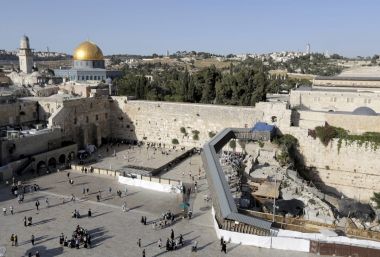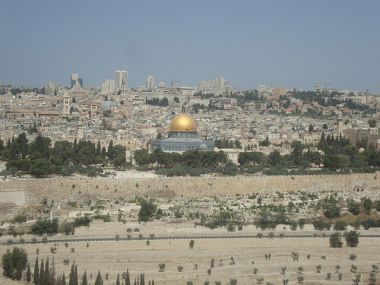Jerusalem: Would an 'international city' be the answer to Israeli-Palestinian clash?

There are many fantastical moments in the West Wing. The much-loved TV series is a fictitious account of the US Presidency over the course of eight years. Among the more unlikely storylines are the kidnapping and safe return of the President's daughter and the leaking of state secrets by a previously loyal servant of the administration. But the most unlikely of all of them is the way the President manages to broker a peace agreement between Israel and the Palestinians – by sending American troops to secure the agreement...
"If I forget you, O Jerusalem, let my right hand wither! Let my tongue cling to the roof of my mouth, if I do not remember you, if I do not set Jerusalem above my highest joy."
Psalm 137 gives us an insight into the importance of Jerusalem in the Hebrew Bible and the Jewish imagination. The city which has evoked so much emotion and longing for the Jewish people over thousands of years remains a place of devotion. Yet it also a sacred place for Christians – the birthplace of the church, the site of the death and resurrection of Jesus and still home to many Christian communities.
The picture gets further complicated when we factor in that Jerusalem is one of the holiest sites in Islam as well. Muslims believe that the city, known in Arabic as Al Quds, is the place the Prophet Mohammed visited on his so-called 'night journey.'
A city which is holy to the three major monotheistic faiths, Jerusalem has also been the site of major battles, sieges, invasions, mass slaughter and incredible rebuilding. It's the focus of cultural, religious and political movements. It's also the site of probably the most disputed piece of property on earth – the Temple Mount or Noble Sanctuary.
For a full account of Jerusalem's rich, bloody, tragic, heroic and wonderful history, I'd recommend Simon Sebag Montefiore's excellent Jerusalem: The Biography as the perfect primer. I read it while living briefly in Jerusalem and it brought the already beautifully vivid city even more to life.
With all this in mind it's unsurprising that when the Vatican's representative to the UN this week suggested that Jerusalem's status should be 'international' it has raised interest among Israelis, Palestinians and the wider international community.
The question of Jerusalem is one of the most difficult to resolve of all the disputes which exist between Israelis and Palestinians. Having been overrun by Nebuchadnezzar, destroyed by the Romans, fought over by the Crusaders, ruled by the Mamluks and governed for much of the last Millennium by the Ottomans (and latterly the British), Jerusalem's modern history comes into focus in the 1940s. When the State of Israel was declared, and the Israelis fought their war of independence, Jerusalem was divided. The east was under Jordanian control while the West fell under Israeli control.
This situation lasted until the Six Day War of 1967. Israel routed the surrounding Arab armies and occupied East Jerusalem (along with the Golan Heights, the West Bank, Gaza and Sinai). This meant that although East Jerusalem remained overwhelmingly Palestinian in its demography, Israel took control.
In 1980 Israel declared Jerusalem to be its "united and eternal" capital. This move has not been recognised by the international community – with most countries retaining their embassies in Tel Aviv. This status remains to the present day – Israel claims that the whole of Jerusalem will always be under its control. This isn't agreed to by the international community, by the UN and certainly not by the Palestinians, whose aim is to have the capital of a future Palestinian state in East Jerusalem. There was briefly hope in the 1990s that the Oslo Peace Accords would herald a solution to the question. But the status of Jerusalem was one of the issues which was never settled by negotiators (along with other very difficult areas, such as the Palestinian refugees from 1948.)
The Holy Sites of Jerusalem, including the Church of the Holy Sepulchre and the Temple Mount/Haram Al Sharif fall into the Old City of Jerusalem. The Temple Mount complex is arguably the most difficult part of the conflict. The area, which is thought to have housed Solomon's Temple, and did house the second Israelite Temple, has, since the Muslim conquest of Palestine, been the site of Al Aqsa Mosque and the Dome of the Rock – two of the holiest sites of Islam. While Jews can pray at the Western Wall, they aren't allowed to pray on the Temple Mount itself. Jordan retains some control of the complex, while the Israeli military has the final say on who can and cannot access the holy sites. Palestinians are denied entry to the Noble Sanctuary on a regular basis and this has been reported as one of the causes of the recent spike in attacks against Israeli civilians and military personnel.
Jewish extremists, sometimes supported by evangelical Christians, have made periodic attempts to raise support for the dismantling of the Dome of the Rock and Al Aqsa Mosque and to begin building a third temple. Such an inflammatory move is rejected by all major players in the region, but remains a popular, though minority, viewpoint.
For this reason, there have been a number of proposals over the years to give the Old City, or indeed a wider area of Jerusalem a special 'international' status (it's something the Vatican has called for previously, for instance). Such a status could see an international force administer the Holy Sites to avoid the periodic accusations that the Temple Mount especially is being miss-appropriated (such as the infamous incident which is supposed to have sparked the second Intifada – uprising – when Israeli President Ariel Sharon toured the compound).

There are precedents in history for international cities, but they don't have a great track record of success. The 'Free City of Danzig' lasted 20 years sandwiched in between Germany and Poland before being swallowed by the carnage of World War Two. Other free cities have existed for a number of years as internationally administered cities, but they have then been reintegrated into neighbouring countries.
Any proposal for Jerusalem would see part of it administered by international authorities (and presumably troops) for an undefined period. But the majority of the city would remain under the control of Israel in the West and the Palestinians in the East. This plan is clearly a long way from fruition.
The problems here are obvious. Does Israel trust the UN? Do Palestinians? If it's not the UN who would run Jerusalem's Holy places, then which organisation would manage it? Which leader has the moral authority on any side to enact such a plan (given that President Bartlet of the West Wing remains fictional)?
But as many holes as there are in the plan, what is the alternative solution? If Israel retains control of East Jerusalem, illegal settlements will continue to grow there which further stymie the chances of peace. If Palestinians can't have autonomous self-determination and govern the parts of Jerusalem which are majority Palestinian, then the sense of hopelessness which periodically leads to spirals of violence will continue.
While an international segment of the city may seem like a non-starter, the status quo is breaking down – and innovative, hopeful and daring solutions might be the only way forward. The future of that wonderful, historic and beautiful city of Jerusalem may depend on it, as may the future of Israel, Palestine and the wider Middle East.











